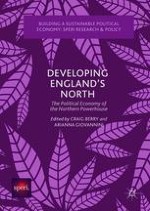This book explores the politics of local economic development in Northern England. Socio-economic conditions in the North – and its future prospects – have become central to national debates in the UK. The status of Northern regions and their local economies is intimately associated with efforts to ‘rebalance’ the economy away from the South East, London and the finance sector in the wake of the 2008 financial crisis. The contributors to this volume focus in particular on the coalition and Conservative governments’ ‘Northern Powerhouse’ agenda. They also analyse associated efforts to devolve power to local authorities across England, which promise to bring both greater prosperity and autonomy to the deindustrialized North. Several chapters critically interrogate these initiatives, and their ambitions, by placing them within their wider historical, geographical, institutional and ideological contexts. As such, Berry and Giovannini seek to locate Northern England within a broader understanding of the political dimension of economic development, and outline a series of ideas for enhancing the North’s prospects.
